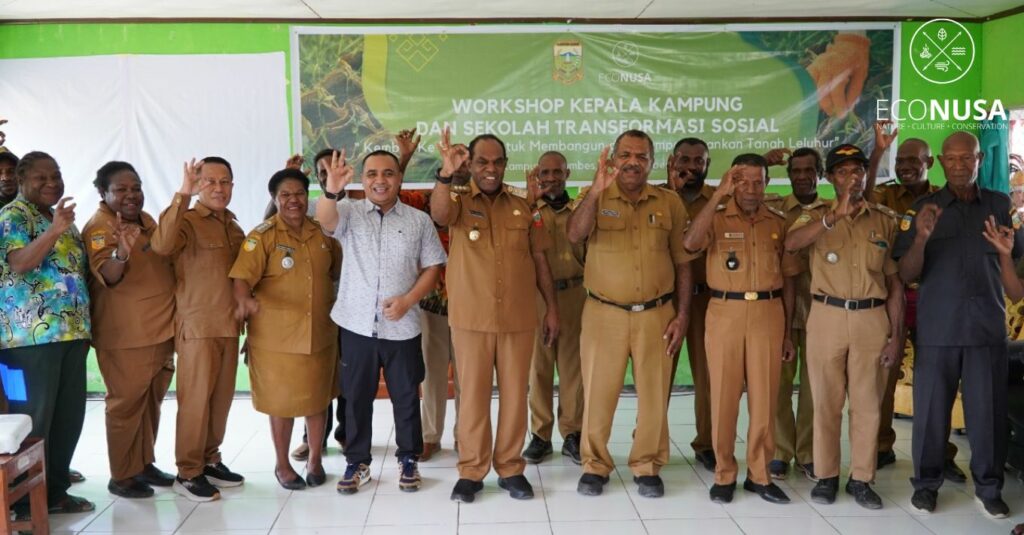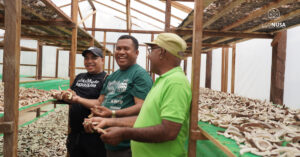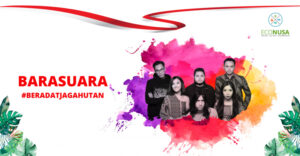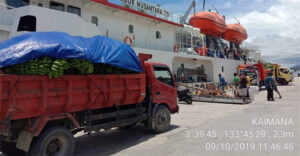
Village is the basis of the region. If village fails to move ahead, the regency will never progress. “Keerom will always be like this (undeveloped), if the village does not move forward,” said the Regent of Keerom, Piter Gusbager, on the opening of the Village Head Workshop (WKK) and Social Transformation School (STS) in Wambes Village, Mannem District, on Monday, 3 October 2022.
Gusbager said that village is the power of Keerom Regency. Village is inhabited by the Native Papuans (OAP) that should be governed by specific manner. Building agriculture and economy to OAP should be done by unique and unusual manner if compared to the common everyday life of economy.
Read Also: Keerom Regent Proclaiming Cultivation of Batara Betel Nut
Many economic programs channelled by the central to regional governments could not run well due to incompatibility with the characteristics of native Papuans. Hence, it needs another way to build the economy of the native Papuan in such a way that the Papuan people could accept and run the program autonomously.
The regent of Keerom admitted that to materialize the independent native Papuan is not an easy stuff. It requires comprehensive assistance.
More than 20 years of Special Autonomy has existed in Papua with fantastic budget. However, the Papuan peoples living in the villages live under standard condition. “So, what is the problem?” Gusbager wondered.
Read Also: Dreaming for Self-reliance with Vanilla in Keerom
Therefore, the Regent of Border Region believed that EcoNusa has their own way with its concept and idea to touch the community in the village. There must be synergy among local government program and EcoNusa program. The collaboration is expected to bring change to the village community.
“Any kind of NGO program is expected to build synergy with the local government program. Once again, building Papuan community in the villages is not an easy job. Commitment and consistence are required to build Papuan community in the village,” he said.
The regent told the village heads, village apparatus and villagers to have stronger role because they serve as the spearhead in local power development. It is them, instead of outsider. Outsider might not build the village sincerely, but it is the village government and its community who should do it.
Read Also: Forest Volunteers Motivate Youth for Real Action at Village
Gusbager reminded that the expectation will never come true if the local apparatus do not have adequate capacity and knowledge. This is the reason that local apparatus should attend the very important activity here. They should have extra knowledge and skill to govern local development.
The Regent said that village apparatus should have ability to analyze the program suitability, field appropriateness, and suitable business development capacity along with the local potential. The government through the relevant offices and NGOs only provides facilitation. The rest is defined by the local apparatus and village community.
Read Also: Restore Faster, Recover Stronger
The head of EcoNusa’s Papua Office, Maryo Saputra Sanuddin, sent his highest appreciation to the Regent of Keerom, local government, and all people in Keerom who support the WKK and STS activities in Wambes Village, Mannem District, Keerom Regency, Papua Province.
Maryo hoped that the process could be followed by all participants so that the village apparatus and cadres have additional information and knowledge that they could apply in their villages.
“I believe if the process here is properly followed, all participants will have clear and measured concept to design useful program and activities for their vilalges,” said Maryo.
Read Also: Sanggase, Vying to be Rice Producer in Okaba District
EcoNusa held a Village Head Workshop (WKK) and Social Transformation School (STS) as part of the School of Eco-Involvement (SEI) programs. It is intended to build local resilience. The SEI program is a series of activity involving local stakeholders. Those 6-day activities were attended by 68 participants from 14 villages in Keerom Regency and 3 villages in Jayapura Regency.
The materials for WKK consist of Policy and Authority of Village Administration, Local Potential and Asset-based Village Plan and Development, integration of potential map into village spatial planning, development of Village Medium Term Development Plan, Village Working Plan, and participatory Village Budget Plan, and development of working plan for result implementation. The STS participants also get theory and practice on cultivation and development of three commodities proposed by the local community and government, Batara betel nut, Vanilla, and Cocoa.
The opening of SEI Keerom was marked by planting Batara betel nut by the Keerom Regent at front yard of Wambes Administration office and distribution of 1,000 Batara seeds to SEI participants from 16 villages. The EcoNusa’s Manager for Natural Resource Management, Siti Masriyah Ambara, and Communication and Youth Mobilization Director, Nina Nuraisyah, attended the opening of SEI Keerom.
Editor: Leo Wahyudi




